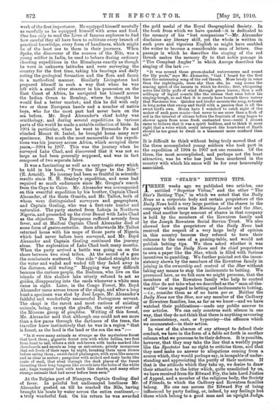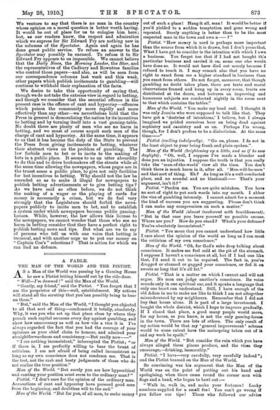1 1:11.0 " STAR'S " BETTING TIPS.
THREE weeks ago we published two articles, one entitled " Superior Virtue," and the other " The Star's Betting Tips," in which we noted that the Daily News as a corporate body and certain proprietors of the Daily News hold a very large portion of the shares in the company which owns the Morning Leader and the Star, and that another large amount of shares in that company is held by the members of the Rowntree family and by the Joseph Rowntree Social Service Trust. We also showed how the proprietors of the Daily News had received the respect of a very large body of opinion in this country because they refused to turn their columns to the uses of a gaming-table, and would not publish betting tips. We then asked whether it was consistent for the Daily News and its chief proprietors to own a paper like the Star, which is filled with furious incentives to gambling. We further pointed out the incon- sistency shown by the members of the Rowntree family in joining in the ownership and control of the Star without taking any means to stop the incitements to betting. We presumed here, as we felt sure we might presume, that the members of the Rowntree family who help to control the Star do not take what we described as the " man-of-the- world " view in regard to betting and incitements to betting, —i.e., consider them as of no harm per se. Neither the Daily News nor the Star, nor any member of the Cadbury or Rowntree families, has, as far as we know—and we have watched their publications—made any public answer to our articles. We can only construe such silence in one way, that they do not think that there is anything savouring of inconsistency, cant, or hypocrisy—the offences which we enumerated—in their action.
In view of the absence of any attempt to defend their conduct, we have in the form of a fable set forth in another column what we presume to be their defence. It is possible, however, that they may take the line that a worldly paper like the Spectator has no right to criticise them, and that they need make no answer to allegations coming from a source which, they would perhaps say, is incapable of under- standing and appreciating the purity of their motives. If that is the attitude which they take up, we desire to draw their attention to the letter which, quite unsolicited by us, we have received from Sir Edward Fry, the late Lord Justice of Appeal, and a member of the religious body, the Society of Friends, to which the Cadbury and Rowntree families belong. No one can accuse Sir Edward Fry of being influenced by party feeling, or, indeed, by any feelings but those which belong to a good man and an upright Judge. We venture to say that there is no man in the country whose opinion on a moral question is better worth having. It would be out of place for us to eulogise him here ; but, as our readers know, the respect and admiration which we express for Sir Edward Fry are nothing new in the columns of the Spectator. Again and again he has done great public service. To refuse an answer to the Spectator may possibly be excused. To refuse it to Sir Edward Fry appears to us impossible. We cannot believe that the Daily News, the Morning Leader, the Star, and the representatives of the Cadbury and Rowntree families who control those papers—and also, as will be seen from our correspondence columns last week and this week, other papers which publish incitements to gambling—will continue to withhold their explanation of the facts.
We desire to take this opportunity of saying that, though we do not take the extreme view in regard to betting, and though we consider that the essential offence in the present case is the offence of cant and hypocrisy—offences which poison the community more rapidly and more effectively than any other—we nevertheless hold that the Press in general is demoralising the nation by its incentives to betting and by turning itself into a vast gaining-table. No doubt there are plenty of men who see no harm in betting, and we must of course acquit such men of the charge of cant and hypocrisy. At the same time, it appears to us that it has become the duty of the State to prevent the Press from giving incitements to betting, whatever their abstract views on the problem of gambling. The law forbids men to bet or to incite to the making of bets in a public place. It seems to us an utter absurdity to do this and to drive bookmakers off the streets while at the same time allowing the newspapers, whose pages are in the truest sense a public place, to give not only facilities for but incentives to betting. Why should not the law be amended so as to make it illegal for newspapers to publish betting advertisements or to give betting tips ? As we have said so often before, we do not think the making of a wager or the playing of cards for money is necessarily a crime, but we do feel very strongly that the Legislature should forbid the news- papers publicly to incite men to bet, and to establish a system under which newspapers become public gaming- houses. While, however, the law allows this license to the newspapers, we cannot wonder that those who see no harm in betting consider that they have a perfect right to publish betting news and tips. But what are we to say of persons who tell us with one voice that betting is immoral, and with another urge us to put our money on " Captain Coe's " selections ? That is action for which we can find no defence.















































 Previous page
Previous page